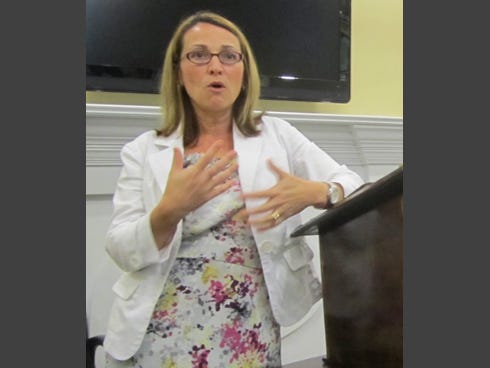
CRESTVIEW — For north Okaloosa County, recycling waste helps the environment and the economy, according to waste managers.
Saving money
"Small businesses say, 'How can you save me money?'" Waste Management District Manager Domenica Farmer said April 10 during the Crestview Area Chamber of Commerce Government Issues Committee meeting.
The answer is simple: recycle.
It costs $20 per ton to recycle, versus $50 per ton to put everything in the trash, Farmer said. Maintaining a landfill costs three or four times as much as single-stream recycling, she said.
"A little bit of effort on their part, and education of employees," can pull many recyclables from the waste stream, reducing the frequency and cost of emptying businesses' trash bins, Farmer said.
Locally, some Tom Thumb stores recycle, which makes more room for trash in waste containers, she said. That reduces the number of more expensive trash collections while increasing less expensive recycle pick-ups.
"There's a financial reward, plus you're doing a great thing for the environment," Farmer said.
The former benefit motivated the Crestview High School French club to start recycling aluminum cans as a fundraiser.
However, “we discovered it takes an awful lot of cans to make any money," Chris Lanoue, the club's adviser, said.
'A social issue'
The state has set a goal of having 75 percent of business and household waste diverted to recycling or composting by 2020, Farmer said.
Most things in people’s trash bins can be recycled or composted, but educating consumers and businesses remains a challenge, she said.
"Most of the population (doesn’t) know what they can recycle," Farmer said. "If you don't know, what are you going to do? You don't recycle."
"Recycling is a social issue," University of West Florida Small Business Development Center Associate Director Tom Hermanson said. "When we look at changing behavior, we should also look at small businesses.
"In the long run, to make real inroads, it's not looking at 2016 and government regulations and how to force the population to use recycling more. I think there's an element … where participation, a partnership, with small businesses could be beneficial."
Local efforts
"There's been some talk about getting bigger recycling bins," Candice Salis, office administrator for Waste Pro, Crestview's trash contractor, said. "That could be in the future, because many customers tell us they're recycling more than putting out actual trash."
More residents are recycling and composting than ever before, Farmer said. However, greater demand is necessary to warrant issuing 96-gallon residential recycling bins or building an Okaloosa County recycling center.
Residents who compost said they recognize the rewards.
By composting, "I turned red clay to black, loamy soil," committee member Cal Zethmayr said, adding he uses the soil for gardening and landscaping.
North Crestview resident Rita Katz said that her family has only needed to wheel a trash bin to the street once every two weeks since they began composting and recycling.
"I wish we had one of the big recycling bins," she said. "The little green tub doesn't hold enough."
Nearly three quarters of waste generated by a typical home can be recycled, Farmer said.
Apart from plastic bags and Styrofoam, "everything else is recyclable," she said.
What goes in the recycle bin?
All recyclable items — including phone books, newspaper, glass, flattened cardboard, aluminum cans and metal containers — can go in one tub, Waste Management District Manager Domenica Farmer said. Rinsing out containers is unnecessary; some residue is expected.
Food waste, plastic bags, plastic containers and packing material are not recyclable, she said.
Organic waste—fruit and vegetable peelings, coffee grounds and filters, tea bags, egg shells and vegetable matter — except for dairy or meat products can be composted.
Contact News Bulletin Staff Writer Brian Hughes at 850-682-6524 or brianh@crestviewbulletin.com. Follow him on Twitter @cnbBrian.
This article originally appeared on Crestview News Bulletin: State goal is to recycle or compost 75 percent of waste by 2020
